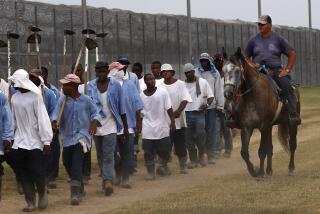Federal Suit Seeks Back Wages for 400 Laborers : Somis: The government says the pay might exceed $1 million. A rancher and 7 others are facing slavery charges.
The U.S. Department of Labor filed suit Wednesday seeking the back wages of an estimated 400 Mexican laborers who were allegedly held against their will and forced to toil for long hours by a Somis flower rancher.
The suit, filed in U.S. District Court in Los Angeles, names the Griffith-Ives Co. of Somis and Edwin M. Ives, owner of the 50-acre ornament flower and greenery ranch.
Ives, 53, his company, six ranch foremen and an alleged smuggler were indicted in May by a federal grand jury in Los Angeles. The jury filed a 15-count indictment, charging the defendants with enslaving more than 100 laborers, forcing them to work for sub-minimum wages and selling them food and sundries at inflated prices from a company store.
Filed on behalf of Mexican laborers who worked on the ranch from 1987 to April of this year, the suit seeks unpaid back wages that could substantially exceed $1 million.
The workers, some recruited from Mexican villages so rural that not even Spanish was spoken in them, said in interviews that they received about $1 an hour while routinely toiling 16 hours a day.
“Our initial investigation shows that as many as 400 workers, including many undocumented Mexican nationals, were grossly underpaid in violation of the Fair Labor Standards Act,” Secretary of Labor Elizabeth Dole said in a statement. “This exploitation cannot be condoned, and we will seek to recover back wages and liquidated damages for these individuals.”
The suit accuses Ives and his company of failing to pay workers at least the federal minimum wage, which was $3.35 an hour between 1987 and April, when it was increased to $3.80 an hour.
Under the federal indictment, Ives could face up to 52 years in prison and $2 million in fines.
Charles Striegel, a spokesman for the Department of Labor, said his agency and the U.S. Department of Justice will cooperate in pursuing their separate cases by sharing information and witness testimony. He said the federal lawsuit could be tried within a year.
Striegel said the lawsuit is intended to compensate all the workers, whether in the country or now in Mexico, regardless of their citizenship status.
Robert M. Talcott, attorney for Ives, said his investigation of the Justice Department’s charges “failed to support any of the allegations.” He called the Labor Department’s lawsuit “absolutely redundant” and a “total misuse of taxpayers’ resources.”
Ives also faces a lawsuit filed in federal court in Los Angeles last month by California Rural Legal Assistance.
The suit, which names Ives, his wife Dolly, seven former ranch overseers and an alleged smuggler as defendants, invokes a federal anti-racketeering law that, if successful, could win 27 Mexican laborers damages three times the $300,000 in back wages they claim to have lost.
Marco Antonio Abarca, a legal-assistance attorney, said the addition of a second federal lawsuit helps his cause because it forces Ives to “spread out his resources to defend himself.”
While the Labor Department’s suit attempts to recover back wages for former workers regardless of where they now reside, the suit by the legal-assistance group seeks only to compensate 27 laborers now living in the United States.
Federal investigators estimate that the Somis farm employed about 100 workers a year. The lawsuit is the outgrowth of a joint investigation by the U.S. Immigration and Naturalization Service, the Department of Labor and the FBI, Striegel said.
More to Read
Sign up for Essential California
The most important California stories and recommendations in your inbox every morning.
You may occasionally receive promotional content from the Los Angeles Times.











